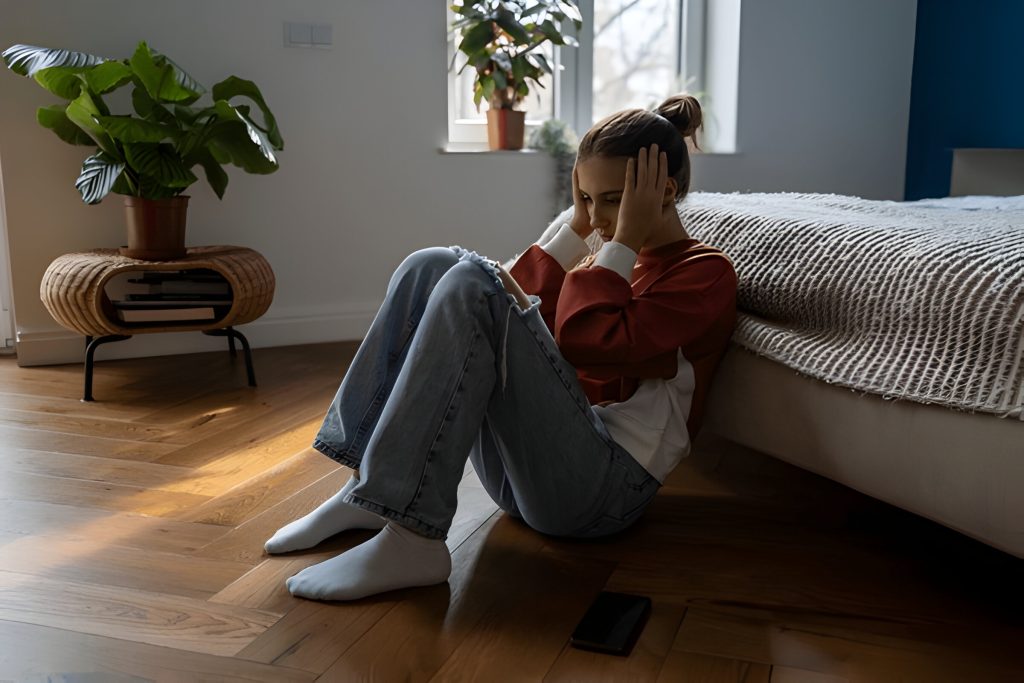- KNOWLEDGE BASE
- EATING DISORDERS
- General Topics
- No posts found for the specified taxonomy and term.
- General Topics
- EATING DISORDERS

SWISS MEDICAL EXPERTISE: ZURICH, MALLORCA, LONDON, MARBELLA


CONDITIONS WE TREAT
PROGRAMS
Intensive residential treatment program starting from 4 weeks. Location: Mallorca, Zurich, London.
Comprehensive second opinion assessments for both psychiatric and general health concerns. Location: Mallorca, Zurich, London
ADDITIONAL INFORMATION





10 Minutes
CONTENTS
Anxiety and intuition are two strong forces that can significantly impact and potentially alter behavior and decision-making processes. Both operate under the surface of conscious awareness and directly shape actions, perceptions, and reactions. Despite the significance, intuition and anxiety remain misunderstood at large, leading to misinterpretations and confusion.
Is it anxiety or intuition? What is the difference, and how to trust your intuition when you have anxiety? Learning the concepts of intuition vs anxiety can help people navigate complex situations and balance the situation more healthily.
Intuition, often known as gut feeling, describes the inner voice that guides an individual toward a specific action or decision without requiring conscious reasoning. [1] Experts consider it a type of high-speed automatic processing that draws on accumulated knowledge, pattern recognition, and past experiences. It is not uncommon for intuition to be incredibly valuable and accurate, especially when individuals must make quick judgments.
The following are the common characteristics of intuition: [2]
Research in the field of neuroscience and cognitive psychology has come up with several mechanisms explaining intuition. Studies have suggested that the human brain uses two systems to process information:
System 1 triggers intuitive thinking, generating quick judgments while drawing on implicit experiences and knowledge. For example, seasoned firefighters have a strong intuition in critical situations. They can feel incoming danger and make important decisions quickly to save lives. This intuitive thinking pattern they use is a skill they have honed over the years due to constant exposure to similar situations. The phenomenon, known as recognition-primed decision-making, helps intuitive thinking patterns access and utilize the collection of tacit knowledge.
Anxiety refers to an emotional response that includes feelings of worry, apprehension, and tension about the adverse outcomes or threats in the future. In contrast to intuition, anxiety comes from uncertainty and fear and may manifest in the form of various physical and mental symptoms. [3]
The following are some common characteristics of anxiety:
Extensive research has been performed on anxiety in psychiatry and psychology. Experts associate it with activating the amygdala, a part of the brain that processes threat and fear-related stimuli. [4] When an individual is in potential danger, their amygdala sets the fight-or-flight response, preparing them to flee or confront the impending threat.
While anxiety helps individuals in certain situations by keeping them alert and vigilant, its chronic presence can be crippling. Generalized anxiety disorder, social anxiety, and panic disorder are some common variants of anxiety and affect millions of people across the world, significantly impairing their daily functioning.
Even though anxiety and intuition may feel similar, the underlying emotional and cognitive processes they come from are different. [5] Moreover, both mechanisms serve different purposes within the human brain. Following are some critical differences between anxiety and intuition:
Despite the apparent differences, anxiety and intuition may interact in complex ways, impacting behavior and decision-making. This interplay can be incredibly challenging as it may confuse a person if their inner signals are based on wise choices or are simply a result of their fears.
Cognitive bias can significantly impact how anxiety and intuition interact. Some biases, such as availability heuristics, which means relying on any examples that immediately come to mind, and confirmation bias, which favors information confirming pre-existing beliefs, can distort intuitive processes. For instance, a person too anxious to speak in public may overestimate the possibility of making a mistake, destroying their assessment of the scenario.
On the other hand, intuitive thoughts may sometimes override analytical thinking, causing errors in judgment, particularly in low-anxiety situations. For instance, a person in a high-stakes environment like a financial market may rely too much on intuition, making risky choices without adequately considering the potential risks.
The relationship between intuition vs anxiety can be cyclical. High anxiety levels cloud intuition, making a person dubious about their gut feeling and forcing them to rely on analytical thinking. This action can make them perform less efficiently, especially in high-pressure situations. Moreover, this self-doubt reinforces anxiety, leading to a feedback look where anxiety crushes intuitive confidence, and the crushed intuitive confidence heightens anxiety.
On the other hand, a strong sense of intuition may sometimes eliminate anxiety, especially when a person has a history of positive outcomes related to intuitive decisions. This confidence reduces their fear of failure and mitigates anxiety, primarily allowing intuition to guide decisions.
Consider the following tips to enhance intuitive skills while controlling anxiety:
The following strategies can hone intuitive processes and skills: [6]
Experiential learning: Participating in activities that improve experiential learning, such as hands-on projects, simulations, and role-playing, can positively impact intuition. These activities also help people develop tacit knowledge that they can use later confidently.
Mindfulness meditation: Regular mindfulness can quieten the mind, making differentiating between anxious thoughts and intuitive insights easier. Moreover, these techniques can also enhance a person’s ability to identify, access, and trust their intuitive thoughts.
Reflection and journaling: Maintain a journal to note all intuitive insights and their outcomes to recognize patterns and improve intuitive abilities. This practice of reflective journaling can help people explore their feelings and thoughts while identifying the source of their anxiety and intuitive thoughts.
Consider the following techniques to manage anxiety healthily:
Both anxiety and intuition are essential for self-discovery and personal growth. Intuition can guide individuals toward more meaningful and fulfilling experiences, whereas anxiety can highlight the areas that require healing.
Consider the following tips to maximize personal growth with the help of intuition:
Consider the following tips to maximize personal growth with the help of anxiety:
Following are some examples of gut feeling vs anxiety in real-life scenarios:
Consider a seasoned surgeon performing a complex operation using his intuitive thought process. Through years of practice, he has acquired a deep pool of tacit knowledge, which helps him pick up subtle cues and patterns that are difficult for others to notice and make decisions. This intuitive expertise helps him save many lives.
Consider a writer anxious about his public perception regarding low creativity levels and cannot trust his intuitive voice. Using cognitive restructuring and mindfulness practices, he gradually overcomes his anxiety, allowing his intuition to resurface more naturally. Techniques like practicing self-compassion, dedicating time to writing, and getting constructive feedback from others slowly help him gain confidence and follow his creative instincts.
The close interplay between anxiety and intuition is a dynamic aspect of human experience. By understanding the distinct characteristics of each and acquiring skills to manage the interaction more healthily, it is possible to foster personal growth, enhance decision-making, and reach a state of greater well-being. Remember, embracing both anxiety and intuition as valuable components of human nature allows individuals to navigate daily situations with greater resilience, authenticity, and wisdom.
Through techniques like cognitive techniques, mindful practices, and experiential learning, it is possible to develop a deeper understanding of the intuitive abilities that can better manage anxiety. This balanced approach empowers individuals to make decisions guided by rational analysis and inner knowledge. Once acquired, this skill can move people to a more fulfilling, resilient, and balanced way of living.
Differentiating between anxiety and intuition requires paying close attention to the physical sensations and emotional tone. Intuition makes you feel confident, clear, and calm, whereas anxiety leads to doubt, nervousness, and physical discomfort. Practicing mindfulness and drawing on past experiences can also help in this differentiation.
Neuroscience and psychology have explained intuition. This phenomenon is linked to the default mode network in the brain, which helps individuals process information subconsciously.
Some signs that anxiety interferes with intuition include experiencing physical symptoms like headaches or tension, feelings of being overwhelmed, and doubting your instincts despite having a solid sense of what feels correct. Additionally, worrying excessively about potential adverse outcomes is also a sign that anxiety is crushing your intuitive thought processes.
Mindfulness practices, such as deep breathing and meditation, can help you recognize the underlying feelings and thoughts while staying in the present moment. This awareness can also improve the ability to understand whether you are experiencing anxiety or intuition, helping you make decisions with a clearer understanding of your inner state.
COGNIFUL is a leading provider of luxury addiction and mental health treatment for affluent individuals and their families, offering a blend of innovative science and holistic methods with unparalleled individualised care.
We believe in the healing power of a community that brings together collective wisdom and individual insight from collective group sessions and activities. We offer a variety of activities and therapies, from group workshops to communal living experiences, every aspect of our program is designed to foster growth, understanding, and self-improvement.
more infoOur program is uniquely designed to meet your needs, with our team closely monitoring your progress. Our therapists are committed to addressing the underlying causes of your challenges, not just the surface symptoms. This deep, root-level therapy extends beyond your stay with us, ensuring enduring success and well-being.
more infoOur team of specialists integrates the most effective strategies from psychological care and holistic medicine, offering you personalized support. This approach includes a range of complementary therapies, all seamlessly coordinated to work together in a comprehensive, integrative manner for your benefit.
more infoThroughout your stay, our dedicated team will ensure a personalized and nurturing experience, providing continuous support and attention. We are committed to guiding you through every step of this transformative journey.
more infoNestled in a serene location close to the calming embrace of the beach, our luxury residence is designed with healing in mind, featuring private suites that offer an oasis of tranquility. Each suite is crafted to provide a personal sanctuary where individuals can reflect, rejuvenate, and recover in peace.
more infoComplex trauma frequently underlies both mental and physical distress. We offer a secure environment, incorporating integrated trauma treatment techniques to facilitate the healing process.
more info